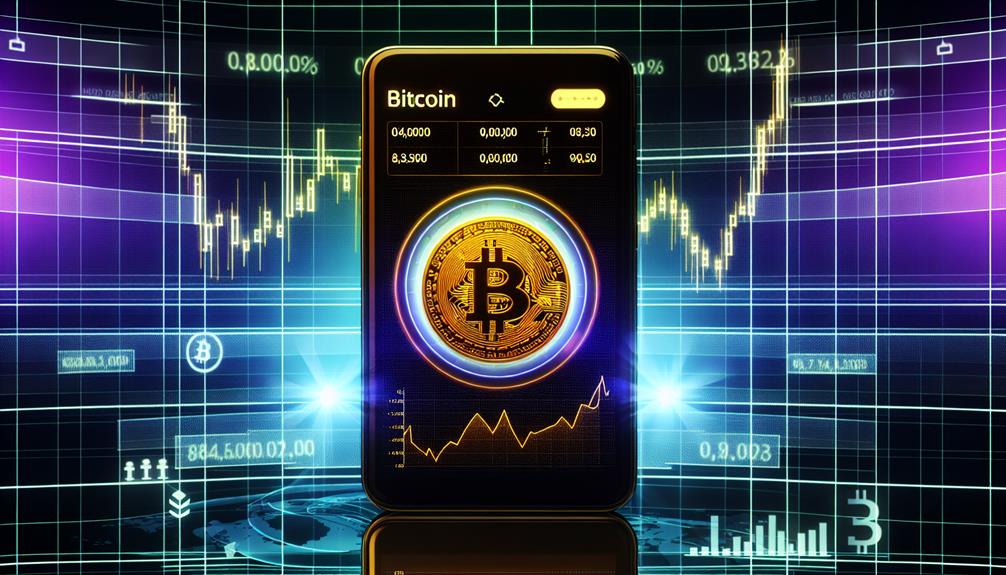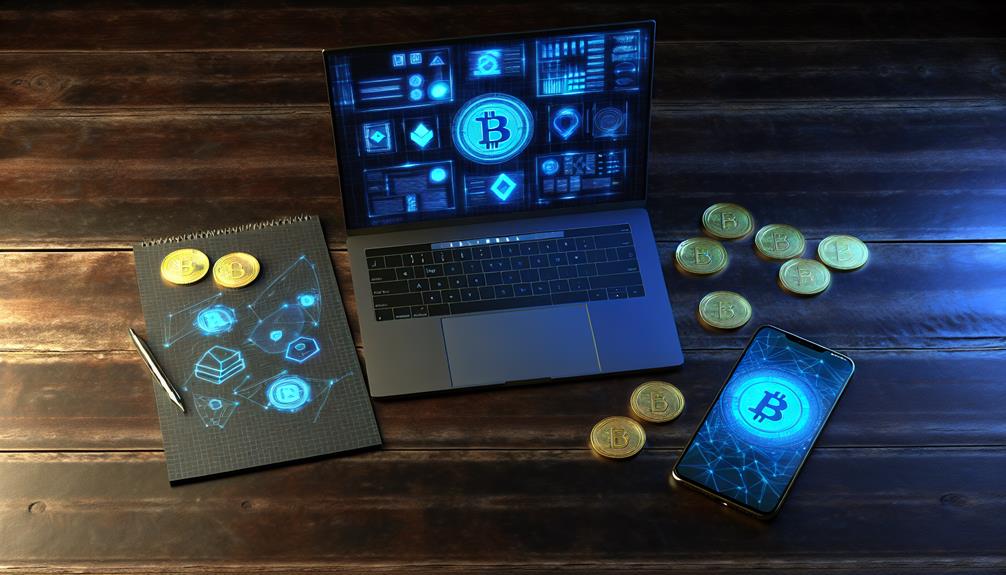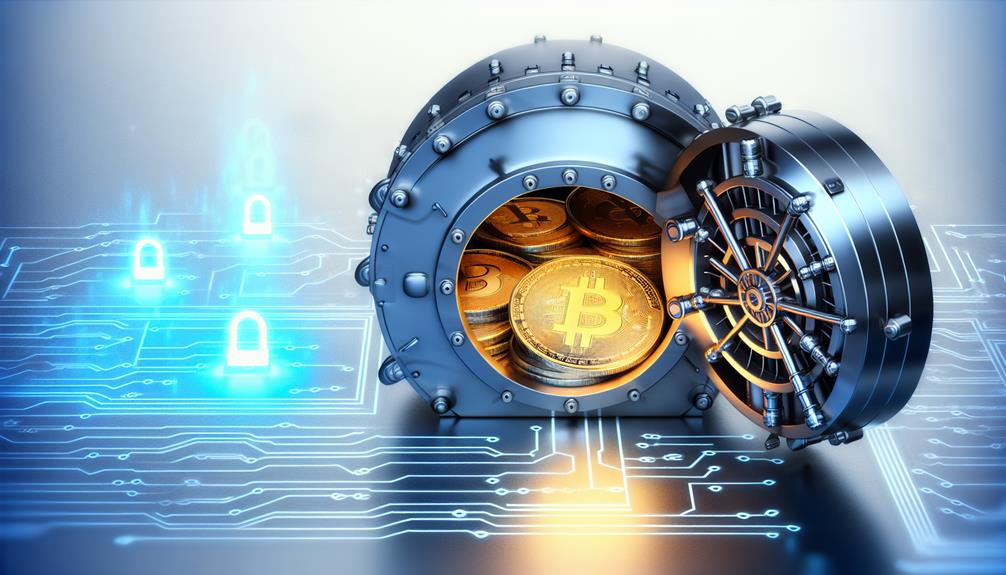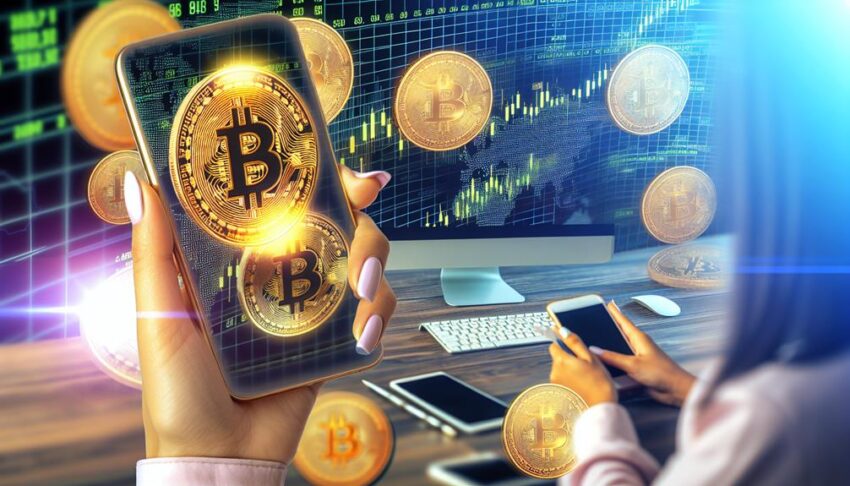Imagine stepping into a vast, uncharted forest, where each path offers a different adventure; that's what buying Bitcoin can feel like. With numerous exchanges, wallets, and investment strategies at your disposal, it can be intimidating to know where to start. You might wonder how to navigate this landscape without getting lost or making costly mistakes. Understanding the foundational steps can guide you through this complex terrain, guaranteeing that your journey into the world of cryptocurrency is both secure and rewarding. What's the first step you should take to guarantee a smooth entry?
Understanding Bitcoin Basics

Understanding Bitcoin basics is essential if you're considering entering the world of cryptocurrency. Bitcoin, launched in 2009 by an anonymous entity known as Satoshi Nakamoto, represents the first successful implementation of blockchain technology. This decentralized ledger facilitates peer-to-peer transactions, eliminating the need for intermediaries like banks.
Bitcoin mining is a significant process within this ecosystem. Miners validate transactions and secure the network by solving complex mathematical problems, earning newly minted bitcoins in return. However, the mining process contributes to Bitcoin's volatility; as demand fluctuates, so does its price. This volatility makes Bitcoin both an attractive investment and a risky one.
Regulations surrounding Bitcoin vary globally, impacting its adoption. Some countries embrace it, while others impose strict regulations or outright bans, influencing how and where Bitcoin transactions can occur. Understanding these regulations is vital for maneuvering the market.
Bitcoin forks, which occur when the community decides to upgrade or change the protocol, can also impact its value and functionality. Notable forks include Bitcoin Cash and Bitcoin SV, which resulted in different versions of the currency with varying capabilities.
As you explore Bitcoin, keep in mind its adoption rate. Institutional interest is growing, reflecting a shift in perception from a niche asset to a legitimate investment vehicle. Understanding these fundamentals can help you navigate the complexities of Bitcoin, ensuring you make informed decisions as you enter the cryptocurrency market.
Choosing a Cryptocurrency Exchange
Selecting the right cryptocurrency exchange is vital for anyone looking to buy Bitcoin. With numerous platforms available, understanding key factors like exchange fees, trading limits, security features, user interface, customer support, and payment methods can help you make an informed decision.
Below is a comparative overview of five popular exchanges:
| Exchange Name | Exchange Fees | Security Features |
|---|---|---|
| Exchange A | 0.1% | 2FA, cold storage |
| Exchange B | 0.2% | Insurance, 2FA |
| Exchange C | 0.15% | Biometric login, 2FA |
| Exchange D | 0.25% | Multi-signature wallets |
| Exchange E | 0.1% | Regular audits |
When evaluating exchanges, consider the following:
- Exchange Fees: Different platforms charge varying fees for transactions, which can greatly influence your investment.
- Trading Limits: Some exchanges impose limits on the maximum amount you can buy or sell, which may restrict your trading plans.
- Security Features: Prioritize exchanges that offer robust security protocols, such as two-factor authentication and cold storage of assets.
- User Interface: A user-friendly interface will make your trading experience smoother, especially if you're a beginner.
- Customer Support: Reliable customer support is important, particularly if you encounter issues or need assistance.
- Payment Methods: Confirm the exchange supports your preferred payment method, whether it's bank transfer, credit card, or digital wallets.
Setting Up Your Wallet

When you're ready to buy Bitcoin, setting up a secure wallet is vital for safeguarding your investment. A cryptocurrency wallet stores your private keys, which grant you access to your Bitcoin. Choosing the right wallet type is essential for ideal wallet security. Here are four main wallet types to evaluate:
- Hardware Wallets: These are physical devices that store your keys offline, making them highly secure against online threats. They're ideal for long-term storage.
- Software Wallets: Available as desktop or mobile applications, these wallets are convenient for regular transactions but are more susceptible to viruses and malware.
- Web Wallets: These wallets operate in the cloud, allowing easy access from any device. However, they depend on third-party security measures, which can be a vulnerability.
- Paper Wallets: A paper wallet is a physical printout of your keys. While they're immune to online attacks, they can be easily lost or damaged.
When setting up your wallet, prioritize wallet security. Enable two-factor authentication (2FA), use strong passwords, and think about encrypting your wallet. Regularly update your software and keep backups of your keys in secure locations. By understanding the different wallet types and implementing robust security measures, you can greatly reduce the risk of theft or loss. Ultimately, taking these steps will bolster your confidence as you venture into the world of Bitcoin investment.
Making Your First Purchase
Making your first Bitcoin purchase involves a few key steps to guarantee a smooth transaction. First, you need to select a reputable cryptocurrency exchange. Look for platforms with high trading volumes and positive user reviews, as these factors often indicate reliability. Once you've chosen an exchange, create an account and complete any necessary identity verification processes. This step is essential for security and compliance with regulations.
Next, fund your account. Most exchanges allow deposits via bank transfers, credit cards, or even PayPal. Keep in mind that payment methods can influence the transaction fees and processing times. After your account is funded, it's time to decide how much Bitcoin you want to buy. Given Bitcoin's price volatility, it's wise to develop a clear investment strategy beforehand. Some investors opt for dollar-cost averaging—purchasing a fixed dollar amount regularly—while others may choose to invest a lump sum.
When you're ready to make the purchase, navigate to the Bitcoin trading section of the exchange. Review the current market price and execute your order. Be aware that prices can fluctuate rapidly, so timing may affect your investment's overall cost. After your order is filled, the Bitcoin will be credited to your wallet on the exchange. From there, you can transfer it to your personal wallet for added security.
Securing Your Investment

After purchasing Bitcoin, securing your investment becomes a top priority. As the crypto market can be volatile, employing effective risk management strategies is vital. Here are four key steps to enhance the security of your Bitcoin holdings:
- Use a Hardware Wallet: Physical wallets store your Bitcoin offline, greatly reducing exposure to online threats. This is one of the most reliable investment strategies.
- Enable Two-Factor Authentication (2FA): Always activate 2FA on your exchange accounts. This adds an extra layer of security by requiring not just your password but also a code sent to your mobile device.
- Keep Software Updated: Verify that your wallet software and any related applications are up-to-date. Developers regularly release updates to patch vulnerabilities, which is necessary for maintaining security.
- Educate Yourself on Phishing Attacks: Be aware of common phishing tactics used to compromise accounts. Always verify the authenticity of emails or websites before entering personal information.
These measures not only protect your investment but also enhance your overall risk management strategy. By implementing these four steps, you can greatly minimize the potential for loss due to theft or fraud. Remember, the landscape of cryptocurrency is ever-changing, and staying informed is key to safeguarding your assets. Prioritizing security will empower you to navigate the market with confidence and make informed investment decisions.
Frequently Asked Questions
Is Bitcoin Legal in My Country?
To determine if Bitcoin's legal in your country, you'll need to research local cryptocurrency laws and Bitcoin regulations. These can vary considerably, affecting how you can use or trade Bitcoin legally.
How Do I Sell Bitcoin After Buying?
Selling Bitcoin can feel like a rollercoaster ride! To maximize profits, consider bitcoin selling strategies that align with current bitcoin market trends. Analyze price movements, choose the right platform, and execute your sale strategically.
What Fees Are Associated With Buying Bitcoin?
When you're buying Bitcoin, you'll encounter transaction costs and exchange fees. These fees vary by platform and can greatly impact your investment. Always compare options to minimize costs and maximize your potential return.
Can I Buy Bitcoin Anonymously?
Maneuvering the digital currency landscape is like walking a tightrope. You can buy Bitcoin anonymously through anonymous exchanges or by using privacy coins, but guarantee you understand the risks and regulations involved to maintain your confidentiality.
What Happens if I Forget My Wallet Password?
If you forget your wallet password, recovery becomes essential. Effective password management can prevent loss. Utilize recovery phrases or backup options to regain access, ensuring your crypto assets remain secure and manageable despite potential setbacks.
Conclusion
In summary, buying Bitcoin isn't just a stroll in the digital park; it's like maneuvering through a financial minefield while juggling flaming torches. You've chosen your exchange, funded your account, and secured your precious coins—congratulations! Just remember, while you're busy waiting for your investment to skyrocket, the crypto market's volatility might have other plans. So, protect your assets with a wallet, and maybe consider a backup plan involving good old-fashioned cash, just in case.
